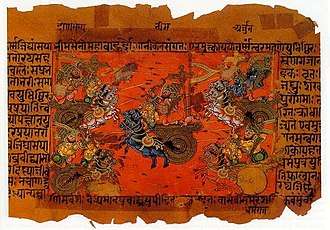Yudhishthira
In the Hindu epic Mahabharata, Yudhishthira (Sanskrit: युधिष्ठिर, IAST: Yudhiṣṭhira) was the eldest son of King Pandu and Queen Kunti and the king of Indraprastha and later of Hastinapura (Kuru). He was the leader of the successful Pandava side in the Kurukshetra War. At the end of the epic, he ascended to heaven. He was also blessed with the spiritual vision of second sight by a celestial Rishi as a boon.
| Yudhishthira | |
|---|---|
The Righteous Pandava | |
 | |
| Successor | Parikshit |
| Weapon | Spear |
| Personal information | |
| Parents | Pandu
(father) Dharmaraj (spiritual father) Kunti (mother) |
| Siblings | Karna Bhima Arjuna Nakula Sahadeva (brothers); Kauravas (parental cousins); Krishna Balarama; (maternal cousins) |
| Spouse | Draupadi Devika [1] |
| Children | Prativindhya (son from Draupadi) Yaudheya (son from Devika) |
Etymology
The word Yudhishthira means "the one who is steady in the war", from the words, yuddha (युद्ध) meaning 'war', and sthira (स्थिर) meaning 'steady'. His other names are-
- Bharata Vanshi (भारत वंशी) – descendant of Bharata[2]
- Ajatashatru (अजातशत्रु) – one who is born without enemies[3]
- Dharmanandan (धर्म नंदन) - The son of Dharma (Righteousness).
- Dharmaraj or Dharmaraya (धर्मराज) - Lord of Dharma.
- Pārtha – son of Pritha, also known as Kunti.
- Panduputra (पांडुपुत्र) - Son of Pandu.
Birth and Upbringing
| Part of a series on |
| Hinduism |
|---|
 |
|
|
Main traditions
|
|
Concepts
|
|
Practices Worship
Arts
Festivals
|
|
Philosophical schools
|
|
Gurus, saints, philosophers
|
|
Texts Scriptures
Other texts
Text classification
|
|
Other topics
|
|

Once a Brahmin rishi, Kindama and his wife were enjoying nature in the forest when Yudhishthira's father Pandu accidentally shot at them, mistaking them for deer. Before dying, Kindama cursed the king to die when he engages in intercourse with any woman. Due to this curse, Pandu was unable to father children. As an additional penance for the murder, Pandu abdicated the throne of Hastinapura, and his blind brother Dhritarashtra took over the reins of the kingdom.[4]
After knowing the curse of Pandu, Kunti told him that he could be the father of child and told her boon of sage Durvasa. Then Pandu requested Kunti to apply her boon and suggested to call Dharma to get a truthful, knowledgeable and justice knowing son who can rule Hastinapur. On the full moon of May (Sanskrit: Jyeshth mah) first and eldest Pandavas Yudhishthira born.
Yudhishthira's four younger brothers were Bhima, (born by invoking Vayu); Arjuna, (born by invoking Indra); and the twins Nakula and Sahadeva (born by invoking Aśvins). If Karna, the son of Kunti born before her marriage by invoking Surya is counted, Yudhishthira would be the second-eldest of Kunti's children.[5]
Yudhishthira was trained in religion, science, administration and military arts by the Kuru preceptors, Kripa and Drona. Specifically, he became a master in using the spear and war chariot. It is said that his spear was so strong that it could penetrate a stone wall as though it were a piece of paper. His chariot always flew at a 4 finger distance above the ground due to his piety.[6]
Marriage and Children
Yudhishthira had two wives, Draupadi and Devika.
After the Lakshyagriha episode, the Pandavas disguised as Brahmins went to the kingdom of Panchala. Here, they attended the Swayamwara of Draupadi, who was the princess of Panchala and the daughter of King Drupada. Arjuna, the younger brother of Yudhishthira, participated in her swayamwara and succeeded in winning her hand in marriage. After the swayamvara, Arjuna along with his brothers, treaded towards the hut where their mother Kunti was waiting for them. As soon as they reached the hut, Arjuna called his mother in delight and said, "Look what we have got as alms". Kunti who was praying at that moment, without looking what exactly it was, commanded "Whatever Arjuna has received as alms should be equally distributed amongst the five brothers." Hence Draupadi was married off to all the five brothers, making her the common wife of the Pandavas.
Vyasa Mahabharata mention Devika only in Adi Parva in the list of Kuru wives. Very little is known of her, except that she was daughter of Govasana from Shivi tribe, and was married to Yudhisthira in a self-choice ceremony. [7]
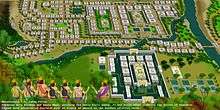
Indraprastha
Performing The Rajasuya
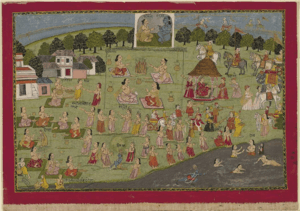
After the coronation at Indraprastha, Yudhishthira set out to perform the Rajasuya yagna.
Arjuna, Bhima, Nakula, and Sahadeva led armies across the four corners of the world to obtain tributes from all kingdoms for Yudhishthira's sacrifice. The non-compliant Magadha king, Jarasandha was defeated by Bhima and Krishna. At his sacrifice, Yudhishthira chose Krishna as his honoured guest.
Losing Kingdom and Exile
Yudhishthira succumbed to Shakuni's challenge in the Pachisi (game of dice). He lost his kingdom, his brothers and Draupadi. While playing for second time, he lost all his kingdom in the game and was forced into exile for 13 years, which included one year in anonymity.
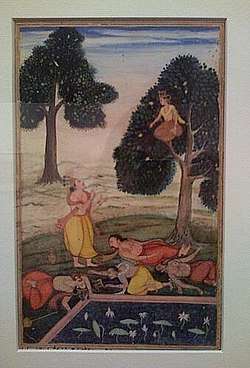
During their exile, the four other Pandavas happened upon a lake, which was haunted by a Yaksha. The Yaksha challenged the brothers to answer his moral questions before drinking the water; the four Pandavas laughed and drank the water anyway. As a result, they choked on the water and died. Yudhishthira went in last, answered many questions put forth to him by the Yaksha and revived his brothers. This story is often cited as an example of Yudhishthira's upright principles.[8] The Yaksha later identified himself as Yudhishthira's father, Dharma and pointed them to the kingdom of Matsya to spend their last year in exile anonymously.
Along with his brothers, Yudhishthira spent his last year of exile in the kingdom of Matsya. He disguised himself as a Brahmin named Kank (among themselves Pandavas called him Jaya) and taught the game of dice to the king.[9]
Return To Indraprastha and Kurukshetra War
When the period of exile was completed, Duryodhana refused to return Yudhishthira's kingdom. Yudhishthira made numerous diplomatic efforts to retrieve his kingdom peacefully but in vain. He was convinced by Krishna to wage war.
The flag of Yudhishthira's chariot bore the image of a golden Moon with planets around it. Two large and beautiful kettle-drums, called Nanda and Upananda, were tied to it.[10][11][12] Before the war started, Yudhisthitra stepped down from his chariot to take blessings firm his grand sire Bhishma, teachers Drona and Kripa and uncle Shalya, who all were in his opposite side in the war showing his respect towards his elders.

On the fifteenth day of the war, Bhima killed elephant Ashwathama and Yudhisthira shouted to Drona about death of a battle elephant named same as Drona's son Ashwathama. Hearing that from the righteous Yudhishthira, Drona dropped his guard and started meditating for death in the middle of battle. Pandava's Commander-in-Chief Dhristadyumna took Drona's sword and killed Drona immediately. This changed the tide of the war totally. Until that moment, any chariot with Yudhishthira always had its wheels hovering 2 inches above ground surface. But immediately after death of Drona, Yudhishthira lost the merit of total truth, and his chariot dropped to the ground.
Yudhishthira had to bend numerous rules of Dharma during the course of the war. Yudhishthira also had to slay a number of warriors, including his own uncle, Shalya in a spear fight and his another uncle, Shalya's younger brother he killed them both on the 18th day of the war when Shalya was the commander-in-chief.
Retirement and Ascent To Heaven
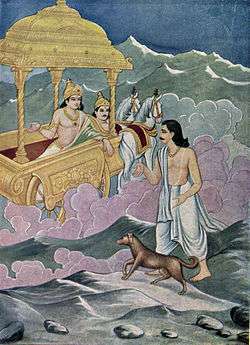
After the war, Yudhisthira was crowned as the Emperor of Hastinapura for 36 years. He performed Ashwamedha Yagya on Krishna's insistence and established Bharat Varsh as one country under his rule. Upon the onset of the Kali yuga and the departure of Krishna, Yudhishthira and his brothers retired, leaving the throne to their only descendant to survive the war of Kurukshetra, Arjuna's grandson, Parikshit. Giving up all their belongings and ties, the Pandavas, accompanied by a dog, made their final journey of pilgrimage to the Himalayas. Among the Pandavas and Draupadi, one-by-one died on the way to reach the top, starting from Draupadi. Finally, it was Yudhisthira who was able to reach the top, with the dog accompanying him.
Dog Test
On reaching the top, Indra asked him to abandon the dog before entering the Heaven. But Yudhishthira refused to do so, citing the dog's unflinching loyalty as a reason. Indra said he let his family die, but Yudhishthira said he could not prevent their deaths, but to abandon a poor creature was a great sin. It turned out that the dog was his god-father Dharma Devatha in disguise.[13]
Test of Patience in Hell
Upon reaching heaven, Yudhishthira did not find either his virtuous brothers or his wife Draupadi. Instead, he only saw Duryodhana and his allies. The Gods told him that his brothers were in Naraka (one of the vedic hells), atoning for their sins.
Yudhishthira loyally went to Naraka to meet his brothers, but the sight of gore and blood horrified him. After hearing the voices of his beloved brothers and Draupadi calling out to him, asking him to stay with them in their misery, he remained. Yudhishthira ordered the divine charioteer to return. He preferred to live in hell with good people than in a heaven with his enemies. Eventually this turned out to be another illusion to test him and also to enable him to atone for his sin of deceiving his guru during the war where he half-lied to Drona about Ashwatthama's death. Thereafter, Indra and Krishna appeared before him and told him that his brothers (including Karna) were already in heaven but so were his enemies.
Yudhishthira's Curse
After he was made aware that Karna was his elder brother, Yudhishthira cursed all women with not being able to hide any secrets. Had Yudhishthira's mother Kunti not kept that fact a secret, the war might have been averted, with millions spared.[14]
Skills
He was said to be very good at spear-fighting and at chariot racing. Yudhishthira was a polyglot, knowing unusual languages. He was known for his honesty, justice, sagacity, tolerance, good behavior and discernment.[15]
Dhritarashtra said to Sanjaya "The son of Kunti and Pandu, Yudhishthira, is virtuous and brave and eschews deeds that bring on shame. Endued with great energy, he hath been wronged by Duryodhana. If he were not high-minded, they would in wrath burn the Dhritarashtras. I do not so much dread Arjuna or Bhima or Krishna or the twin brothers as I dread the wrath of the king, O Suta, when his wrath is excited. His austerities are great; he is devoted to Brahmacharya practices. His heart's wishes will certainly be fulfilled. When I think of his wrath, O Sanjaya, and consider how just it is, I am filled with alarm."[16]
Yudhishthira acquired deep spiritual knowledge from Lord Shiva and many prominent sages including Vyasa, Parashurama, Bhrigu, Savarni Manu, Narada, Markandeya, Asita Devala and Dhaumya. (Mahabharata Sabha Parva Section 77).
In The media
Being a character in Indian epic and an important person in Mahabharata, this role has been enacted by various actors over the years. Two most famous actors to have played this role are Gajendra Chauhan in the 1988 television series Mahabharat, and Rohit Bharadwaj in the 2013 series Mahabharat. Both were offered the role of Lord Krishna first and then Yudhishthira. Manoj Bajpayee has also voiced the character in the animated Mahabharat. In 2015 series Suryaputra Karn, Kanan Malhotra played the role. There is a red dragon in the Iron Realms Entertainment game Aetolia, The Midnight Age named Yudhishthira.
Citations
- https://web.archive.org/web/20100116130453/http://www.sacred-texts.com/hin/m01/m01096.htm
- Ashram, Vidur Sewa (1979). Age of Bhārata War. Motilal Banarsidass Publishers. p. 167.
- Godbole, Justin E. Abbott a. Pandit Narhar R. (1988). Stories of indian saints (4th ed.). Delhi: Motilal Banarsidass. p. 402. ISBN 9788120804692.
- Lochtefeld, James G. (2002). The illustrated encyclopedia of Hinduism (1st. ed.). New York: Rosen. pp. 194–196. ISBN 9780823931798.
- van Buitenen, J. A. B., ed. (1973). The Mahābhārata. Book 1 The Book of the Beginning. Translated by van Buitenen. Chicago: University of Chicago Press. pp. 470–471. ISBN 0226846636. OCLC 831317.
- Mittal, J.P. (2006). History of ancient India : a new version. New Delhi: Atlantic. p. 477. ISBN 9788126906161.
- https://www.sacred-texts.com/hin/m01/m01096.htm
- Sehgal, Sunil (1999). Encyclopaedia of Hinduism (1st ed.). New Delhi: Sarup & Sons. ISBN 9788176250641.
- Kishore, B. R. (2001). Hinduism. New Delhi: Diamond Publ. ISBN 9788171820733.
- "Mahabharata Text".
- "Mahabharata Text".
- Kapoor, Subodh, ed. (2002). The Indian encyclopaedia : biographical, historical, religious, administrative, ethnological, commercial and scientific (1st ed.). New Delhi: Cosmo Publications. p. 4462. ISBN 9788177552713.
- Agarwal, Satya P. (2002). Selections from the Mahabharata : re-affirming Gita's call for the god of all (1. Aufl. ed.). Delhi: Motilal Banarsidass. ISBN 9788120818743.
- transl. (2004). Buitenen, J.A.B. van (ed.). Book 11. The book of the women. Chicago [u.a.]: Univ. of Chicago Press. ISBN 9780226252506.
- "Mahabharata Text".
- "Mahabharata Section XXII".
